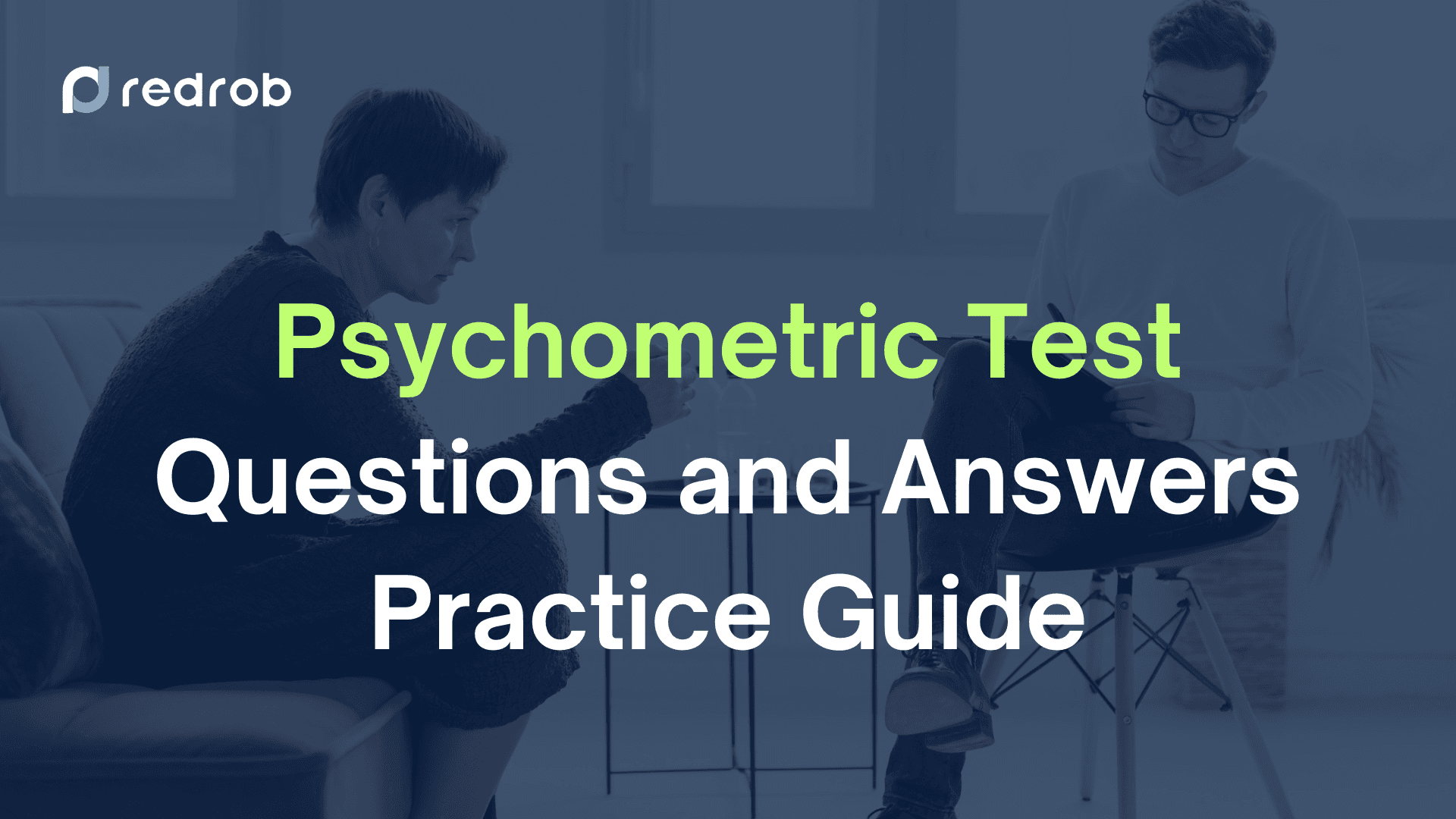Psychometric Test Guide
8 min read
•
Oct 28, 2024

Soumyata Singh
Are you preparing for a job application or a career change? If so, you should be prepared to face psychometric test questions. These tests are designed to assess your abilities and personality traits. They can seem daunting at first, but they offer valuable insights into your skills.
Understanding the different types of psychometric tests is essential. You’ll learn about numerical reasoning, verbal reasoning, and more. Each type helps employers gauge how well you fit a role.
In this blog, we’ll explore the importance of these tests. You’ll discover tips for effective preparation and examples of sample questions. By the end, you'll feel ready to tackle any psychometric test with confidence. Let’s get started!
Introduction to Psychometric Tests
Psychometric tests assess your cognitive abilities and personality traits. They measure how well you think, reason, and solve problems. They also give insight into your behaviors, values, and motivations.
These tests are vital in recruitment. Employers use psychometric test questions to filter candidates effectively. Instead of relying solely on resumes or interviews, these tests offer an objective way to assess potential. According to a 2023 survey, over 75% of large companies use psychometric testing in their hiring process. This shows just how important these assessments have become in modern recruitment.
Psychometric tests also reduce bias. The questions focus on your abilities and traits, not your background. For example, a numerical reasoning test will assess how well you interpret data, while a personality test might explore how you handle stress at work.
As we continue, let’s explore the different types of psychometric tests, each playing a unique role in evaluating candidates.
Types of Psychometric Tests
Psychometric test questions come in two main types: aptitude tests and personality tests. Each type serves a unique purpose in assessing your skills, traits, and overall suitability for a role.
Aptitude Tests
Aptitude tests measure your reasoning and cognitive abilities. These tests are designed to evaluate how well you handle numbers, words, and abstract patterns. They typically include three main areas:
Numerical reasoning: Involves solving problems with percentages, ratios, or interpreting charts. For instance, you might be asked to compare sales figures over several months.
Verbal reasoning: Tests your ability to understand written information and draw logical conclusions. An example would be reading a paragraph and answering a question based on the passage.
Abstract reasoning: Assesses your pattern recognition and problem-solving skills. You might be asked to complete sequences of shapes or identify patterns in a series of figures.
These tests are common in recruitment. A study revealed that 68% of employers use aptitude tests to assess cognitive abilities. The results help employers identify candidates who can think critically and solve problems efficiently.
Personality Tests
Personality tests assess your behaviors, drives, and values. These tests are used to determine if your traits align with the job role or company culture. Common traits evaluated include:
Openness to experience: Indicates how adaptable or creative you might be in new situations.
Conscientiousness: Measures your reliability, organization, and attention to detail.
Emotional stability: Examines how well you handle stress and challenging situations.
For example, a sales position might require a candidate with high extroversion and strong persuasion skills, while a more analytical role may favor introverted traits. Psychometric test questions in personality tests provide a clear picture of how you may behave in different workplace scenarios.
As you explore sample questions, you'll gain a deeper understanding of how these tests are structured and what they assess.
Next, let's explore specific psychometric test questions you must prepare for.
Sample Psychometric Test Questions and Answers

Psychometric test questions help assess your abilities in various areas like numerical reasoning, abstract reasoning, verbal reasoning, and inductive reasoning. Below are some sample questions and answers for each type of reasoning.
1. Numerical Reasoning
Numerical reasoning tests assess your ability to work with numbers and data. You’ll often encounter ratios, percentages, and data interpretation questions.
Sample Question:
A company’s revenue increased from $500,000 to $600,000 in one year. What is the percentage increase?
Answer:
The increase is $100,000. To find the percentage increase:
Percentage increase = 100,000/500,000 x 100 = 20%
Sample Question:
If you have a ratio of 4:5 for apples to oranges, and you have 40 apples, how many oranges do you have?
Answer:
Let the number of oranges be x. The ratio is set up as:
40/x = 4/5
Cross-multiply:
4x = 200
So, x = 50. You have 50 oranges.
These questions test your ability to quickly solve numerical problems, often under time constraints.
2. Abstract Reasoning
Abstract reasoning tests measure your ability to identify patterns and complete sequences, often using shapes or figures.
Sample Question:
Which shape comes next in this sequence?
○ ▬ △ ○ ▬ △ ○ ▬ ?
Answer:
The sequence repeats every three shapes: circle (○), rectangle (▬), triangle (△). The next shape is a circle (○).
Sample Question:
Complete the pattern:
▲ ▲ ■ ■ ▲ ▲ ■ ■ ?
Answer:
The pattern alternates two triangles (▲) and two squares (■). The next shape should be two triangles (▲ ▲).
Abstract reasoning psychometric test questions challenge your ability to spot patterns and complete them logically.
3. Verbal Reasoning
Verbal reasoning tests assess your ability to understand written information and draw logical conclusions.
Sample Question:
"All managers in the company have at least 5 years of experience. John is a manager at the company." What can you conclude?
Answer:
John has at least 5 years of experience.
Sample Question:
"Most employees in the marketing department have attended a workshop. Sam is in the marketing department." Can you conclude Sam attended the workshop?
Answer:
No. It says "most," not "all," so Sam may not have attended the workshop.
Verbal reasoning psychometric test questions require you to interpret written statements accurately.
4. Inductive Reasoning
Inductive reasoning tests assess your ability to make logical deductions and predict outcomes based on patterns.
Sample Question:
The numbers 2, 4, 8, 16, follow a pattern. What’s the next number?
Answer:
Each number is double the previous one. The next number is 32.
Sample Question:
In the sequence of letters: A, C, F, J, ?, what comes next?
Answer:
The pattern adds 1, then 2, then 3, then 4 spaces between letters. After J (fourth step), add 5 spaces. The next letter is O.
Inductive reasoning psychometric test questions help gauge how well you can draw conclusions from given patterns.

Preparation for Psychometric Tests
Preparing for psychometric test questions is crucial to perform well. Here’s how you can get ready for these tests.
1. Research Test Requirements and Publisher
Start by researching the specific psychometric test you'll take. Different publishers have different styles and formats. Some focus more on numerical reasoning, while others emphasize personality traits. Knowing the test’s focus helps you tailor your preparation.
For example, tests by SHL and Kenexa have different styles. SHL tests are known for their time pressure, while Kenexa tests might have more verbal reasoning. Make sure to understand what you're dealing with to avoid surprises.
2. Practice with Sample Tests
Practicing sample psychometric test questions will significantly improve your performance. Sample tests help you get familiar with question types and formats. The more you practice, the more confident you’ll become.
For instance, online platforms often offer free sample tests that mimic real ones. Use them to hone your skills in numerical, abstract, and verbal reasoning. Studies show that candidates who practice regularly perform better than those who don’t.
3. Importance of Timing
Timing is everything in psychometric tests. Most tests have strict time limits, and you need to balance speed and accuracy. Practice under timed conditions to simulate the real test environment.
For example, if you have 20 minutes to complete 30 questions, practicing with that time limit will help you manage your pace. The more you practice timed tests, the better your ability to make quick decisions without losing accuracy.
In the next section, let’s take a look at some useful test-day tips that will help you excel in psychometric tests.
Test Day Tips
When test day arrives, proper preparation can make all the difference. Use these tips to ensure success when tackling psychometric test questions.
1. Read Instructions Carefully
The first thing you should do is carefully read the instructions. Skimming through them might lead to mistakes. Each section of psychometric test questions can have different formats or rules. A clear understanding of the task is essential to avoid errors and maximize your score.
For example, some tests may ask you to select more than one answer, while others need only one. Misinterpreting the instructions can cost you valuable points.
2. Balance Speed and Accuracy
In timed psychometric test questions, balancing speed with accuracy is key. Rushing through the test might lead to careless mistakes, while being too slow can leave questions unanswered. Aim for a steady pace.
One tip is to answer the easier questions first, then go back to the more difficult ones. This strategy helps you maximize your score within the time limit. Remember, it’s not just about how many questions you answer, but how many you answer correctly.
3. Utilize Rough Paper
Using rough paper during the test helps with calculations and planning responses. For numerical reasoning questions, writing down steps ensures you don’t lose track of your thought process. It’s especially helpful for more complex problems.
Many test-takers find that sketching out shapes during abstract reasoning questions or jotting down key points in verbal reasoning makes it easier to stay organized. Take advantage of this to work through questions systematically.
Now that you know how to approach test day, let’s understand why practicing psychometric tests is important for improving your overall performance.
Why Practicing Psychometric Tests is Important?
Regular practice with psychometric test questions is essential for performing well. It enhances your familiarity with the format, improves your skills, and boosts overall performance. Here's why you should make practice a priority:
1. Familiarity with Format
The more you practice, the more familiar you become with the format of psychometric test questions. This reduces test anxiety and boosts your confidence. You know what to expect, so you spend less time figuring out the structure and more time focusing on answering correctly.
Familiarity also helps you understand the specific question types, such as numerical reasoning or abstract reasoning, allowing you to approach each with a clear strategy.
2. Skill Development
Practicing psychometric test questions helps you identify and improve your weaknesses. For example, if you struggle with abstract reasoning, repeated practice allows you to work on pattern recognition and sharpen your skills.
Using practice tests as a learning tool helps target areas where you need the most improvement. With time, you’ll see noticeable progress.
3. Performance Improvement
Continuous practice enhances your accuracy and response time. You get better at answering questions quickly and correctly, which is critical when tests are timed. The more you practice, the more efficient you become.
Improved speed and accuracy are especially helpful for numerical reasoning questions, where time pressure can affect performance. The ability to solve problems swiftly will give you an edge over others.
By understanding the importance of practice, you’re better prepared for psychometric tests.
Conclusion
Continuous practice is key to mastering psychometric test questions. Regularly working on sample questions enhances your skills and reduces test anxiety. The more familiar you are with the formats, the more confident you will feel on test day.
Additionally, these assessments provide an objective measure of your abilities and personality traits. Unlike traditional interviews, psychometric tests offer unbiased insights into your strengths and areas for improvement. This helps you and your potential employers make informed decisions.
By preparing effectively, you position yourself for success. Embrace the challenge of psychometric tests, and you’ll see the benefits in your career journey.
Get your hands on the most lucrative opportunities within less than 20 days with Redrob. SignUp for FREE.



